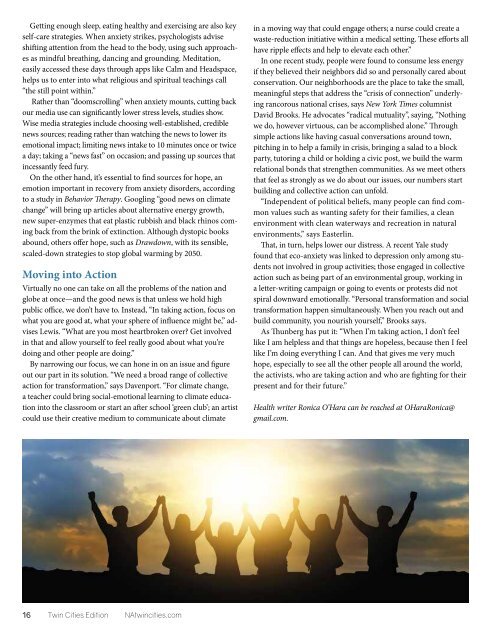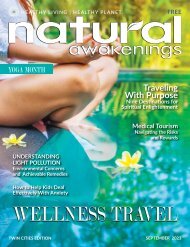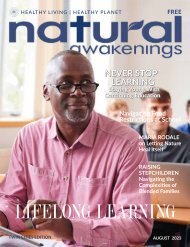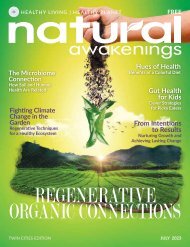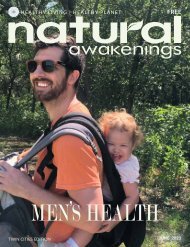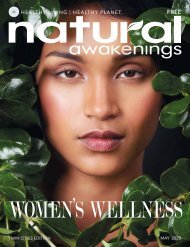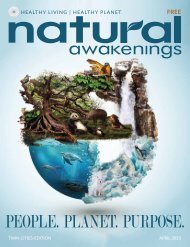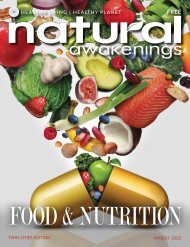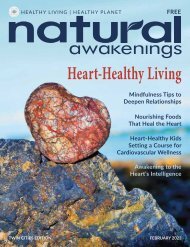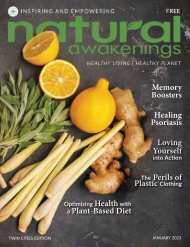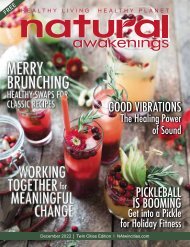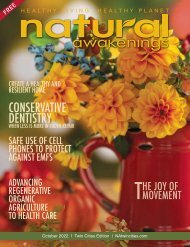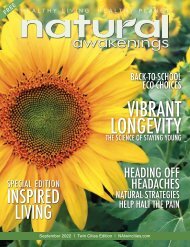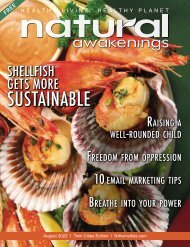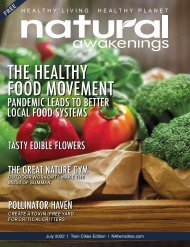Natural Awakenings Twin Cities November 2022
Read the November 2022 edition of Natural Awakenings Twin Cities magazine. This is our annual Mental Health and Well-being Issue which features articles on staying calm during turbulent times, self-care strategies for anxiety, art therapy for kids, mushrooms and herbs for mental wellness, healing mental health in the new age, grief on the healthcare frontlines and so much more. Be sure to check out our local content, including News Briefs announcements, Community Resource Guide with providers throughout the metro who can meet your individual wellness needs, and all the happenings in the Calendar of Events. There is additional online-only content that can be found at NATwinCities.com.
Read the November 2022 edition of Natural Awakenings Twin Cities magazine. This is our annual Mental Health and Well-being Issue which features articles on staying calm during turbulent times, self-care strategies for anxiety, art therapy for kids, mushrooms and herbs for mental wellness, healing mental health in the new age, grief on the healthcare frontlines and so much more.
Be sure to check out our local content, including News Briefs announcements, Community Resource Guide with providers throughout the metro who can meet your individual wellness needs, and all the happenings in the Calendar of Events. There is additional online-only content that can be found at NATwinCities.com.
Create successful ePaper yourself
Turn your PDF publications into a flip-book with our unique Google optimized e-Paper software.
Getting enough sleep, eating healthy and exercising are also key<br />
self-care strategies. When anxiety strikes, psychologists advise<br />
shifting attention from the head to the body, using such approaches<br />
as mindful breathing, dancing and grounding. Meditation,<br />
easily accessed these days through apps like Calm and Headspace,<br />
helps us to enter into what religious and spiritual teachings call<br />
“the still point within.”<br />
Rather than “doomscrolling” when anxiety mounts, cutting back<br />
our media use can significantly lower stress levels, studies show.<br />
Wise media strategies include choosing well-established, credible<br />
news sources; reading rather than watching the news to lower its<br />
emotional impact; limiting news intake to 10 minutes once or twice<br />
a day; taking a “news fast” on occasion; and passing up sources that<br />
incessantly feed fury.<br />
On the other hand, it’s essential to find sources for hope, an<br />
emotion important in recovery from anxiety disorders, according<br />
to a study in Behavior Therapy. Googling “good news on climate<br />
change” will bring up articles about alternative energy growth,<br />
new super-enzymes that eat plastic rubbish and black rhinos coming<br />
back from the brink of extinction. Although dystopic books<br />
abound, others offer hope, such as Drawdown, with its sensible,<br />
scaled-down strategies to stop global warming by 2050.<br />
Moving into Action<br />
Virtually no one can take on all the problems of the nation and<br />
globe at once—and the good news is that unless we hold high<br />
public office, we don’t have to. Instead, “In taking action, focus on<br />
what you are good at, what your sphere of influence might be,” advises<br />
Lewis. “What are you most heartbroken over? Get involved<br />
in that and allow yourself to feel really good about what you’re<br />
doing and other people are doing.”<br />
By narrowing our focus, we can hone in on an issue and figure<br />
out our part in its solution. “We need a broad range of collective<br />
action for transformation,” says Davenport. “For climate change,<br />
a teacher could bring social-emotional learning to climate education<br />
into the classroom or start an after school ‘green club’; an artist<br />
could use their creative medium to communicate about climate<br />
in a moving way that could engage others; a nurse could create a<br />
waste-reduction initiative within a medical setting. These efforts all<br />
have ripple effects and help to elevate each other.”<br />
In one recent study, people were found to consume less energy<br />
if they believed their neighbors did so and personally cared about<br />
conservation. Our neighborhoods are the place to take the small,<br />
meaningful steps that address the “crisis of connection” underlying<br />
rancorous national crises, says New York Times columnist<br />
David Brooks. He advocates “radical mutuality”, saying, “Nothing<br />
we do, however virtuous, can be accomplished alone.” Through<br />
simple actions like having casual conversations around town,<br />
pitching in to help a family in crisis, bringing a salad to a block<br />
party, tutoring a child or holding a civic post, we build the warm<br />
relational bonds that strengthen communities. As we meet others<br />
that feel as strongly as we do about our issues, our numbers start<br />
building and collective action can unfold.<br />
“Independent of political beliefs, many people can find common<br />
values such as wanting safety for their families, a clean<br />
environment with clean waterways and recreation in natural<br />
environments,” says Easterlin.<br />
That, in turn, helps lower our distress. A recent Yale study<br />
found that eco-anxiety was linked to depression only among students<br />
not involved in group activities; those engaged in collective<br />
action such as being part of an environmental group, working in<br />
a letter-writing campaign or going to events or protests did not<br />
spiral downward emotionally. “Personal transformation and social<br />
transformation happen simultaneously. When you reach out and<br />
build community, you nourish yourself,” Brooks says.<br />
As Thunberg has put it: “When I’m taking action, I don’t feel<br />
like I am helpless and that things are hopeless, because then I feel<br />
like I’m doing everything I can. And that gives me very much<br />
hope, especially to see all the other people all around the world,<br />
the activists, who are taking action and who are fighting for their<br />
present and for their future.”<br />
Health writer Ronica O’Hara can be reached at OHaraRonica@<br />
gmail.com.<br />
16 <strong>Twin</strong> <strong>Cities</strong> Edition NAtwincities.com


